最新新视野大学英语第四册教案Unit5
Book4unit-5 新视野大学英语读写教程第四册unit 5
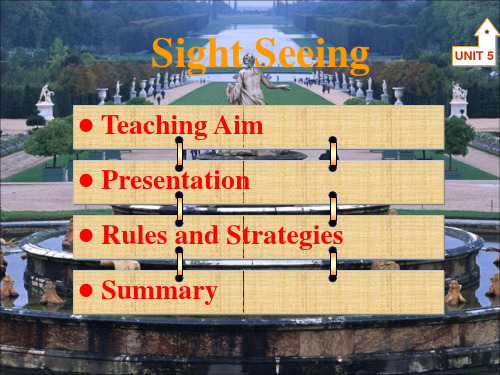
Teaching Aim
UNIT 5
Presentation Rules and Strategies
Summary
Teaching Aims
• Students could prepare a presentation about one city or special tourist attraction working in groups; • Students could present the sightseeing information about the city or the tourist attraction, and other students could acquire the information; • Students could learn the rules and strategies for presenting and translating information of sightseeing.
云南
拉萨 广西 四川 西安 湖南 洛阳 南昌 云南 湖南
龙门石窟
滕王阁 西双版纳 张家界
Scenic Spots (Chinese)
北京
北京 河南 江西
河北
Additional Vocabulary
Mogao Caves
Yellow Crane Tower
West Lake Yellow Mountain Sun Yat Sen Mausoleum
莫高窟 黄鹤楼 西湖 黄山 中山陵 孔庙 碑林 太湖 三峡 秦皇陵 泰山 大雁塔 乐山大佛
少林寺 北戴河 中山陵 颐和园 大雁塔 莫高窟
黄果树瀑布 龙门石窟 乐山大佛 九寨沟风景区 布达拉宫 武陵源风景区
新视野大学英语第四册教案Unit5
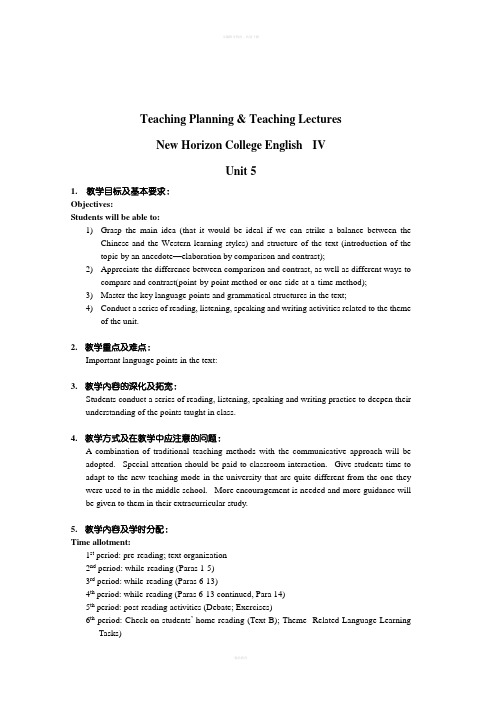
Teaching Planning & Teaching LecturesNew Horizon College English IVUnit 51.教学目标及基本要求:Objectives:Students will be able to:1)Grasp the main idea (that it would be ideal if we can strike a balance between theChinese and the Western learning styles) and structure of the text (introduction of the topic by an anecdote—elaboration by comparison and contrast);2)Appreciate the difference between comparison and contrast, as well as different ways tocompare and contrast(point-by-point method or one-side-at-a-time method);3)Master the key language points and grammatical structures in the text;4)Conduct a series of reading, listening, speaking and writing activities related to the themeof the unit.2. 教学重点及难点:Important language points in the text:3. 教学内容的深化及拓宽:Students conduct a series of reading, listening, speaking and writing practice to deepen their understanding of the points taught in class.4. 教学方式及在教学中应注意的问题:A combination of traditional teaching methods with the communicative approach will beadopted. Special attention should be paid to classroom interaction. Give students time to adapt to the new teaching mode in the university that are quite different from the one they were used to in the middle school. More encouragement is needed and more guidance will be given to them in their extracurricular study.5. 教学内容及学时分配:Time allotment:1st period: pre-reading; text organization2nd period: while-reading (Paras 1-5)3rd period: while-reading (Paras 6-13)4th period: while-reading (Paras 6-13 continued, Para 14)5th period: post-reading activities (Debate; Exercises)6th period: Check on students’ home reading (Text B); Theme- Related Language Learning Tasks)6. 主要参考书目:郑树棠,胡全生,2003,《新视野大学英语综合教程4-教师用书》。
新视野大学英语读写教程第4册教案doc新视野大学英语教案
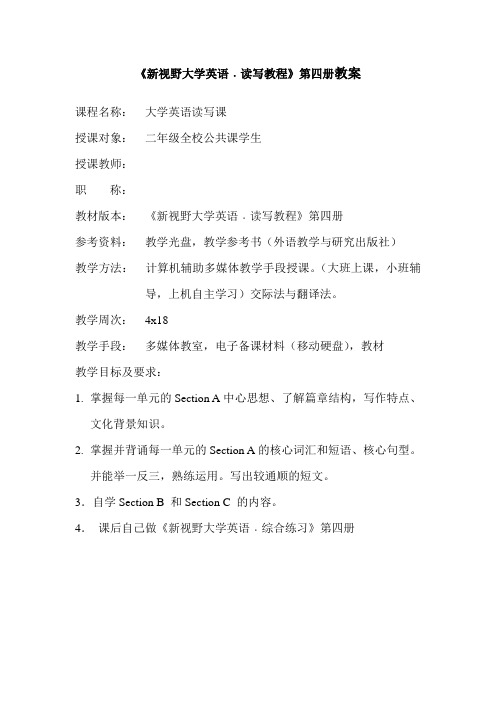
《新视野大学英语﹒读写教程》第四册教案课程名称:大学英语读写课授课对象:二年级全校公共课学生授课教师:职称:教材版本:《新视野大学英语﹒读写教程》第四册参考资料:教学光盘,教学参考书(外语教学与研究出版社)教学方法:计算机辅助多媒体教学手段授课。
(大班上课,小班辅导,上机自主学习)交际法与翻译法。
教学周次:4x18教学手段:多媒体教室,电子备课材料(移动硬盘),教材教学目标及要求:1.掌握每一单元的Section A中心思想、了解篇章结构,写作特点、文化背景知识。
2.掌握并背诵每一单元的Section A的核心词汇和短语、核心句型。
并能举一反三,熟练运用。
写出较通顺的短文。
3.自学Section B 和Section C 的内容。
4.课后自己做《新视野大学英语﹒综合练习》第四册新视野大学英语教案Unit One (Book Four)一、教学内容(Content of the Course)Section A. The Temptation of a Respectable Woman (精讲)Section B. The Obligations and Responsibilities to Marriage(略讲)Section C. The Positive Meanings of Love (泛读)二、教学对象(Audience)三、教学时间(Teaching Span)6-7学时四、教学目的(Teaching Aims)1.Appreciate the text to know sth. about what happened between Mrs. Baroda and her husband’s friend.2. Learn to use some important words, expressions and sentence patterns.3. Practice listening, speaking, reading and writing.4. Learn some translation skills五、教学任务及步骤(Instruction Objectives &. Teaching Procedures)Step One Pre-reading Activities (导入)文章主题(Themes)10 minutes课文A向我们讲述了一位女性与她丈夫的一位生性沉默的朋友一起度过的一段时间,描写了她对这位朋友在感情上发生的变化。
新视野大学英语第四册unit5
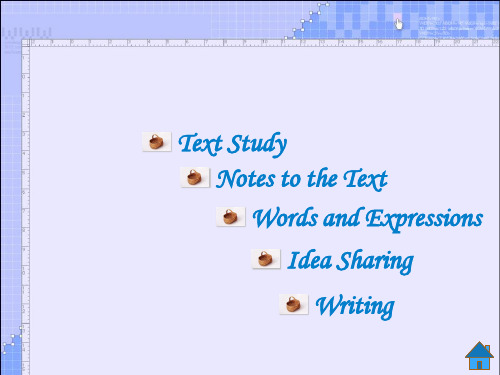
Text Study—Structure Analysis
Paragraphs
1 2 3-10 11-13 14-16
Ways of Development
Narration
Arguments + Comparison Arguments + Narration + Examples
Arguments + Examples + Comparison
Text Study—Understanding
4. Why is it important for a person living alone to talk to others?
Because it is a basic need of a solitary person.
Text Study—Understanding
3. What can be learned from Thoreau’s choice of the solitary way of life?
The more positive one is towar d oneself, the less the need fo r staying with others.
I. Structure Analysis
A. The Way to Develop This Text
Arguments + Narration + Examples + C omparison
The text focuses on a social phenomenon— cho osing to be alone on purpose. What people think of living alone, who prefers living alone, the life o f the solitary people, and what the writer advises for living alone.
第二版新视野大学英语4课件unit5

Phrases and Expressions
1. on purpose intentionally; not by accident
Translation
她似乎是有意地做这些事以引起他的注意。
Key She seems to do these things on purpose to attract his attention.
埋葬了好友之后,他感到很孤独。
• She has lived _a_lo_n_e__ in this house for almost five years now...
她已在这所房子里独自住了近5年。
• He was _d_e_so_l_at_e_ without her. 没有她,他感到孤独而凄凉。
不能强行规定人们应该怎样生活。 我拒绝听从他的指使。
Key
You can’t dictate to people how they should live. I refuse to be dictated to by him.
• Conscience dictates truthfulness. • 良心促使人吐真言。
on purpose
intentionally; not by accident
Translation
I came here on purpose to see you.
•我特意到这儿来看你的。
on special purpose.
on good/ill purpose. on no purpose.
我们怎能找到一个真正适当的人来做这项工作?
5. set forth 动身;阐述
Example
He set forth on a three-month trip around the world.
新视野大学英语(第2版)第4册 课后习题参考答案 Unit 5
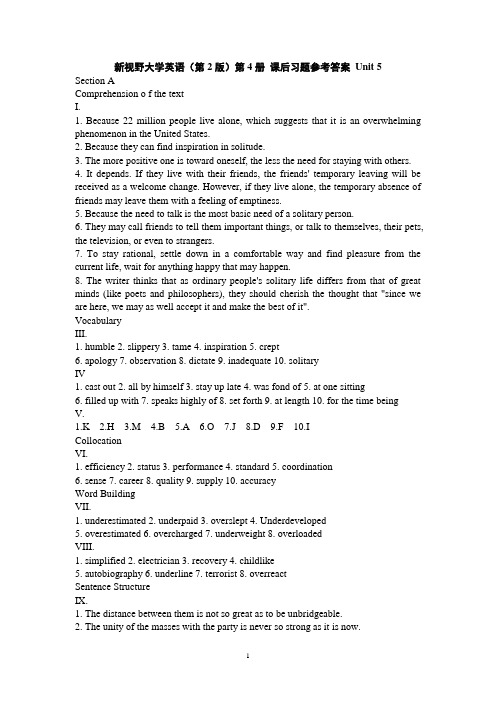
新视野大学英语(第2版)第4册课后习题参考答案Unit 5 Section AComprehension o f the textI.1. Because 22 million people live alone, which suggests that it is an overwhelming phenomenon in the United States.2. Because they can find inspiration in solitude.3. The more positive one is toward oneself, the less the need for staying with others.4. It depends. If they live with their friends, the friends' temporary leaving will be received as a welcome change. However, if they live alone, the temporary absence of friends may leave them with a feeling of emptiness.5. Because the need to talk is the most basic need of a solitary person.6. They may call friends to tell them important things, or talk to themselves, their pets, the television, or even to strangers.7. To stay rational, settle down in a comfortable way and find pleasure from the current life, wait for anything happy that may happen.8. The writer thinks that as ordinary people's solitary life differs from that of great minds (like poets and philosophers), they should cherish the thought that "since we are here, we may as well accept it and make the best of it".VocabularyIII.1. humble2. slippery3. tame4. inspiration5. crept6. apology7. observation8. dictate9. inadequate 10. solitaryIV1. cast out2. all by himself3. stay up late4. was fond of5. at one sitting6. filled up with7. speaks highly of8. set forth9. at length 10. for the time beingV.1.K2.H3.M4.B5.A6.O7.J8.D9.F 10.ICollocationVI.1. efficiency2. status3. performance4. standard5. coordination6. sense7. career8. quality9. supply 10. accuracyWord BuildingVII.1. underestimated2. underpaid3. overslept4. Underdeveloped5. overestimated6. overcharged7. underweight8. overloadedVIII.1. simplified2. electrician3. recovery4. childlike5. autobiography6. underline7. terrorist8. overreactSentence StructureIX.1. The distance between them is not so great as to be unbridgeable.2. The unity of the masses with the party is never so strong as it is now.3. The punishment was harsh because Maggie would lose her position, but it was not so bad as losing her pay.4. I've heard the terrible noise once or twice before, but never so loud as this one.5. Men are never so peaceful, so graceful with each other as they are now.X.1. You might as well go there to see whether there is the information you need.2. We might as well call it freedom.3. You might as well ring and tell them you're going to visit them.4. We might as well walk home.5. We might as well find an easier one to read.TranslationXI.1. This little man is not so innocent as he appears.2. There's nothing I can do about the problem, so you might as well turn to Professor Wang for help.3. Both sides speak highly of the fruits in their cooperation in different areas, and hope that the cooperation can be furthered.4. On the one hand, an image of being close to the people can get a new policy more easily accepted. On the other hand, it will "encourage people to speak their minds and come up with constructive suggestions".5. His sense of loneliness rose and fell and he sometimes would talk at length to himself and his pets and the television.6. After all, money is not everything. The richest people are not necessarily the happiest.XII1.新的机制并不像他们预期的那样有效,因为数月过去了,但管理效率并没有明显改进。
新视野大学英语4读写教程unit 5讲义
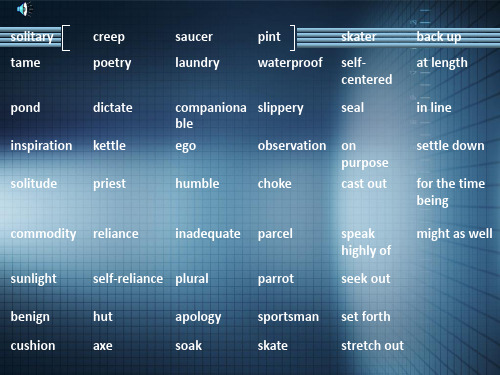
导入
预习
小结 写作
Back
Para. 4 Consider Dorothy Wordsworth, for instance, helping her brother William put on his coat, finding his notebook and pencil for him, and waving as he sets forth into the early spring sunlight to look at flowers all by himself. "How graceful, how benign, is solitude," he wrote.
inadequate parcel
sunlight
self-reliance plural
parrot
speak highly of
seek out
might as well
benign
hut
cushion
axe
apology soak
sportsman skate
set forth stretch out
随笔
词汇学习
课文分析
导入
预习
小结 写作
Back
Choose to Be Alone on Purpose
Para. 3 Inspiration in solitude is a major commodity for poets and philosophers.They're all for it.释义 They all speak highly of themselves for seeking it out, at least for an hour or even two before they hurry home for tea.
第二版新视野大学英语第四册读写教程unit5课件资料
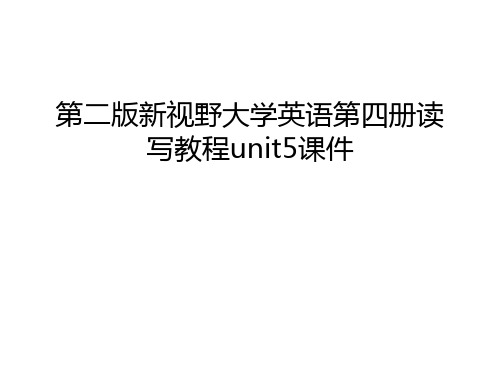
导入
预习
小结
写作
New Words
Back
solitary tame pond inspiration solitude commodity sunlight benign cushion creep
a. 独自的;喜欢独处的 v./a. 驯服,控制 / 温顺的 n. [C] 池塘 n. [C, U] 灵感 n. [U] 独居,孤独 n. 1. [C] 必需品 2. [C]商品,货物 n. [U]阳光,日光 a. 善良的,慈祥的,温和的 n. [C] 坐垫,垫子 vi. 潜行;蹑手蹑脚地移动
Detailed Study of Text
Back
Para 7 You may have noticed that most of these artistic types went outdoors to be alone. The indoors was full of loved ones keeping the kettle warm till they came home.
洗衣店
New Words
Back
companionable a. 友善的,友好的
ego
n. 1.自我 2. 自我价值感
humble
a. 1. 谦逊/谦虚的 2. 地位/身份低下的
inadequate a. 不充分的,不充足的
plural
a./n. 复数的 / 复数形式
apology
n. [C] 道歉
Detailed Study of Text
Back
Para 2 Loneliness may be a sort of national disease here, and it’s more embarrassing for us to admit than any other sin. 句型 On the other hand, to be alone on purpose, having rejected company rather than been cast out by it, is one characteristic of an Ameri句c型an hero. The solitary hunter or explorer needs no one as they venture out among the deer and wolves to tame the great wild areas. Thoreau, alone in his cabin on the pond, his back deliberately turned to the town. Now, that’s character for you.
新视野大学英语第三版读写教程第四册Unit 5 Why culture counts教案
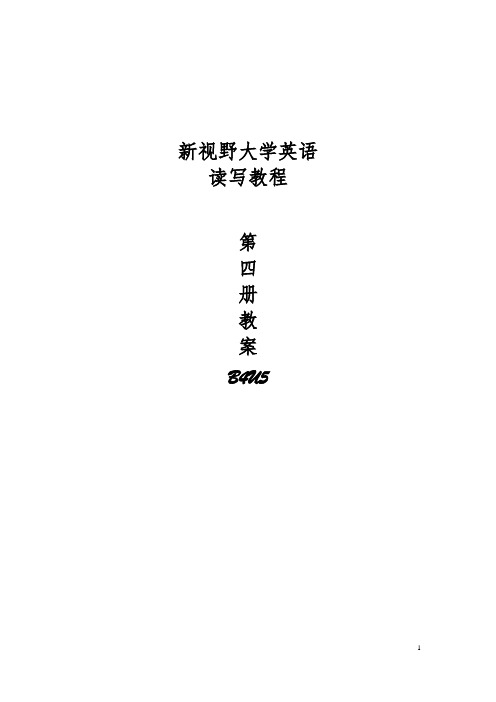
新视野大学英语读写教程第四册教案B4U5Unit 5Why culture counts*Teaching Objectives:Students will learn to use English to1. To talk about a stereotype of Chinese language and culture2. To further understand the text3. To apply the phrases and sentence patterns4. To master the paragraph (essay) writing skill*Time Allotment: each unit 8 classes1st---2nd classes: Part I Warming up1.Lead-in : Background introduction and theme-2.Understanding of the text: Detailed understanding focusincluding Topic Sentence, Key Words, Logic Words, Reading Clues etc. in order to help some questions about it.3rd--4th classes:Part II Text Study3.Reading in Depth: Structure Analysis, Summary, Difficult sentences analysisnguage Focus: More practice in Language Points (language points explanation,Sentence Patterns, Useful Expressions)5th—6th classes:Part III Reflection5.Critical thinking: More speaking practice in discussion related to stereotypes of aforeign country and how to deal with cultural differences.6.Writing Practice: Essay writing• A frustrating experience• An unforgettable experience•A difficult decision7th—8th classes: Part IV Assignment7. Post-reading activities: review words and expressions, role-play, exercises, etc8. Section B: Focus on fast reading and Practice in reading skillUNIT 5Section A Speaking Chinese in AmericaPart I Warming up1. Lead-in:1) Answer QuestionsQ1. Some Westerners think that Chinese people tend to avoid saying “no” directly. What are the common ways in which the Chinese express disagreement, rejection or refusal in daily communication?Tips: Chinese people generally use expressions like “possibly no” or “I’m afraid it won’t work” to say “no” to others. This makes them less direct in giving rejections.Q2. Are all Chinese so “discreet and modest” that there aren’t even words for “no”?Tips: No. When people with greater authority or power say “no” to those in a lower status (e.g. parents to children), they can be very direct and straightforward, e. g. “absolutely no”.2) Listen and talkListen to a radio program on compliments in American English. Complete the answers to the following questions.Q1. What are the common structures Americansuse to compliment each other?(a) What a …! (e.g. “What a nice hat!”)(b) ___________________________________(Give one structure and one example)Tips: I like your … (e.g. “I like your hat.”)I love your … (e.g. “I love your shoes.”)Q2. Are there any differences between Chinese and American cultures in how people compliment each other and how they respond to a compliment?Tips: Yes, the traditional way is to say something to show that we or the object we own is not that good. For example, we may say “哪里”(meaning “it is nothing”). But in modern days, many people have adopted the English way of responding to a compliment. They say “thank you” very often too.3) Compound dictationChina is casting such a huge __________ on the United States that many Americans are ______________ to learn the Chinese language _____________ retain their competitive edge. “Interest in learning Chinese among American youth and their parents has grown dramatically in the past five years.”said Vivien Stewart, vice president at the Asia Society, a US group trying to __________________ between Americans and the peoples of Asia and the Pacific. China’s dramatic rise to near superpower ________ and its telling effects politically, economically,and ___________ are driving the interest to learn the language, experts say. From_________________ to high schools, studies by the Asia Society show, there is a “rapid rise” in __________ among pupils to study the Chinese language.The Chinese rich cultural traditions and blossoming economy mean that is now ______________ all of our students to be better prepared to engage them and _______ opportunities together,” said Michael Levine, Asia Society’s executive director of education. Keys: shadow, scrambling, in a bid to, bridge the gap, status, culturally, kindergartens, interest, essential for, seize.2. Cultural Background: Chinese AmericansDiscuss with your partner the following questions:1) What does Chinese Americans refer to?Tips: The term “Chinese Americans” refers to Americans of Chinese descent. It also includes those with partial Chinese ancestry.2) What stereotypes of Chinese Americans are depicted in the media?Tips:·Chinese Americans are “foreign” and “unassimilated”.·Chinese are alien predators.·Chinese Americans are restricted to clichéd occupations.·Chinese Americans are polite.·Chinese Americans as a whole are a model minority.3) What are the popular columns in the history of the New York Times Magazine? Tips: Some of the popular columns in the history of the magazine are “On Language”, “The Ethicist”, “Consumed”, and “The Funny Pages”.Part II Text Study1. Global Reading:Tips for Reading: A Good Reader should1) Try to become an active reader.2) Learn to ask more questions. ( what, why, how)3) Do the efficient reading. (key points, topic sentence, key words, locatingwords, necessary and sufficient )4) Develop a habit of marking during reading.1.1 Answer Questions1) Why did the author’s mother describe her Sau-sau by using the expression “nominal courtesy” at the dinner? (Para.1)Tips: She just pretended to be polite. (ate up the dish in the end; although she didn’t want it at first.)2) When the author’s mother offered the last scallop from the garlic seafood dish, Sau-sau’s response: (Para.2)Tips:3) What did the author’s mother suggest as the right way for the Chinese to respond at the dinner table in America? (Para. 8)Tips: They say directly whether they want to have anything or not. They would rather than refuse for the sake of politeness even if they in fact want to eat it.4) How did the article in The New York Times Magazine describe Chinese language and culture? (Para.10)Tips: It said that Chinese language and culture were very indirect and polite.5) Why did the author’s parents scold her when she answered them with a question? (Paras.13-17)Tips: They thought that she was not respectful if she questioned them.6) In Paragraph 21, the author mentions how an outside observer might view Chinese people by just listening to her mother speak. Why does she discuss this?Tips: To support her opinion that to understand the difference between languages and behavior just through literal translation may lead to wrong generalizations.7) What did the author worry? (Para. 22)Tips: See Chinese people from a limited perspective;Lead to actual intolerance and fewChinese in top management positions;The power of language.8) How does the author feel about the description of Chinese people as being “modest and polite”? (Para. 24)Tips: She feels that it is annoying because such a description does not express new ideas, honest emotions or considered thought.9) According to the text, how do Chinese people say “yes” or “no” when answering questions? (Para. 28)Tips: Saying something specific to what is asked because there is no one word in Chinese for “yes” or “no”.Referring directly to the proposition being asserted or denied.1.2 Structure Analysis:1.3 SummaryOnce, at a dinner, my mother whispered to me confidentially: “Sau-sau pretends too hard to be a polite __________! Why bother with such nominal ___________? In the end, she always takes everything.” My mother no longer patient with old taboos and courtesies.I read an article in The New York Times Magazine, where the author mentioned that the interwoven _______________ of Chinese language and culture renders its speech indirect and polite. Chinese people are so “_________ and modest”, that there aren’t even words for “yes” and “no”.If I consider my upbringing carefully, I find there was nothing discreet about the Chinese language I grew up with, no ____________ for the sake of politeness. Having listened to both Chinese and English, I’m ______________ comparisons between the two languages, as I notice the reciprocal challenges they each present.Even more dangerous is the temptation to view the _____ between different languages and behavior in translation. There is no one word for “yes” or “no”, but not _________________ to be discreet. ____________, I would say the Chinese equivalent of answering “yes” or “no” is specific to what is asked.Keys: recipient, courtesy, configuration, discreet, censorship, suspicious of, gulf, out of necessity, If anything.2. Language Focus:2.1 Practical Phrases1). be attached to: 与……有联系举例:不要担心,因为这仅是意外,学生不应该受到指责。
新视野大学英语第四册 unit5B Culture makes the business world go round
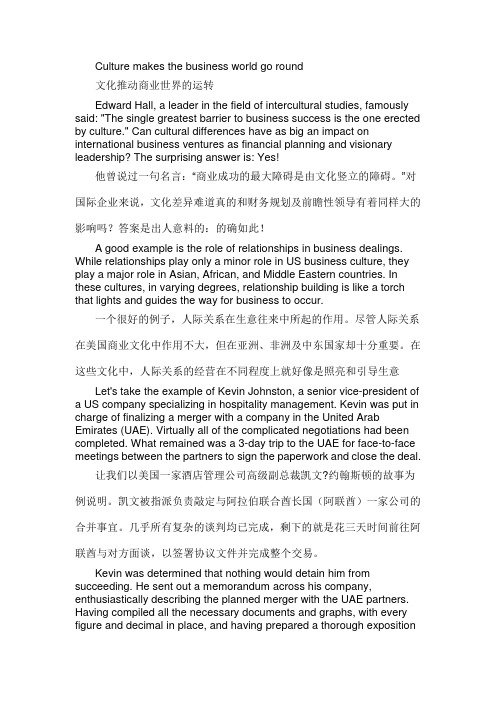
Culture makes the business world go round文化推动商业世界的运转Edward Hall, a leader in the field of intercultural studies, famously said: "The single greatest barrier to business success is the one erected by culture." Can cultural differences have as big an impact on international business ventures as financial planning and visionary leadership? The surprising answer is: Yes!他曾说过一句名言:“商业成功的最大障碍是由文化竖立的障碍。
”对国际企业来说,文化差异难道真的和财务规划及前瞻性领导有着同样大的影响吗?答案是出人意料的:的确如此!A good example is the role of relationships in business dealings. While relationships play only a minor role in US business culture, they play a major role in Asian, African, and Middle Eastern countries. In these cultures, in varying degrees, relationship building is like a torch that lights and guides the way for business to occur.一个很好的例子,人际关系在生意往来中所起的作用。
新视野第四册unit5教案
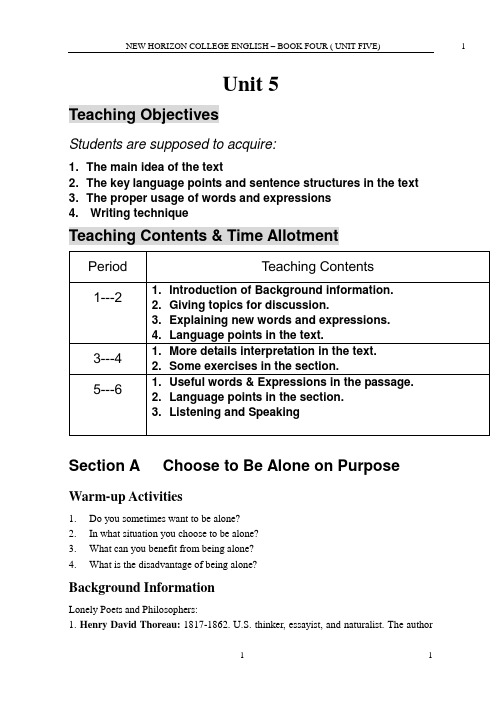
Unit 5Teaching ObjectivesStudents are supposed to acquire:1. The main idea of the text2. The key language points and sentence structures in the text3. The proper usage of words and expressions4. Writing techniqueTeaching Contents & Time AllotmentSection A Choose to Be Alone on Purpose Warm-up Activities1. Do you sometimes want to be alone?2. In what situation you choose to be alone?3. What can you benefit from being alone?4. What is the disadvantage of being alone?Background InformationLonely Poets and Philosophers:1. Henry David Thoreau: 1817-1862. U.S. thinker, essayist, and naturalist. The authorof WaldenThoreau's House: Copied by Charles H. Overly from a drawing done by Thoreau's sister, Sophia.Famous quotations by Henry David ThoreauThe youth gets together his materials to build a bridge to the moon, or, perchance (偶然, 恐怕), a palace or temple on the earth, and, at length (最后), the middle-aged man concludes to build a woodshed (贮放柴薪的木棚) with them.Books are the treasured wealth of the world and the fit inheritance (遗传, 遗产) of generations and nations.Books, not which afford us a cowering (畏缩, 退缩) enjoyment, but in which each thought is of unusual daring (大胆的); such as an idle man cannot read, and a timid one would not be entertained by, which even make us dangerous to existing institution--such call I good books.If you have built castles in the air, your work need not be lost; that is where they should be. Now put the foundations under them.The heart is forever inexperienced.There is no remedy for love but to love more.2. John Milton: 1608-1674. English poet, one of the greatest poets of the English language.Milton was born in London on December 9, 1609 as the son of a wealthy notary (公证人). He was educated at St. Paul's School. Milton received a Master’s degree from Cambridge University in 1632. In 1638, he undertook a European tour where he met many of the major thinkers of the day, especially in Italy.On his return to England, Milton became a Puritan (清教徒), and an opponent of the Catholics and of the Stuarts (英国斯图亚特王室). He was also an ardent (热心的, 热情洋溢的) polemicist (善辩论者), a follower of Cromwell (克伦威尔), and the latter's foreign language secretary. In 1652 he became completely blind. His first wife died in 1652 and he remarried in 1656.After the restoration of the Stuarts he suffered considerable persecution (迫害). He withdrew from active participation in politics and concentrated on his poetry. Paradise Lost was published in 1667, followed by Paradise Regained and Samson Agonistes in 1671. Among other popular works by Milton are the elegy (悲歌, 挽歌) "Lycidas", Comus , a masque (假面舞会), and the companion pieces "L'Allegro" and "Il Penseroso."3. William Wordsworth: 1770-1850. British poet, who spent his life in the Lake District of Northern England. Wordsworth’s personality and poetry were deeply influenced by his love of nature, especially by the sights and scenes of the LakeCountry, in which he spent most of his mature life. A profoundly earnest and sincere thinker, he displayed a high seriousness tempered (调节) with tenderness and a love of simplicity.PreviewThe patterns of personal relationships are changing across the globe. Traditional families and friendships are giving way to more modern interrelationships. In the following articles, the writers present a range of practices that characterize this period of relational and familial change; living alone, sharing a room with others and arranged marriage. Passage A looks at two contrasting sides of solitude: the American hero or literary giant who chooses to be alone and how solitude is seen as promoting both a strong character and creative inspiration and, how individuals feel about and react to loneliness that is not of their own choosing. The second passage discusses the problems that can arise when college students have to share a dormitory with each other. Differences in preferred lifestyles can often lead to irritation and tension and can occasionally explode into violence.New Words1. deer n. [C]a large, grass-eating animal, the male of which has antlers 鹿a herd of deer/wolves/cattle 一群鹿a flock of sheep/birdsa school of fisha swarm of bees2. tame: v. 1. make sb. or sth. easy to control 制服,控制并利用tame a river 治理河流Atomic energy has been tamed and harnessed for useful work.原子能已被控制并得到实际应用。
新视野大学英语4第三版unit5课文教案
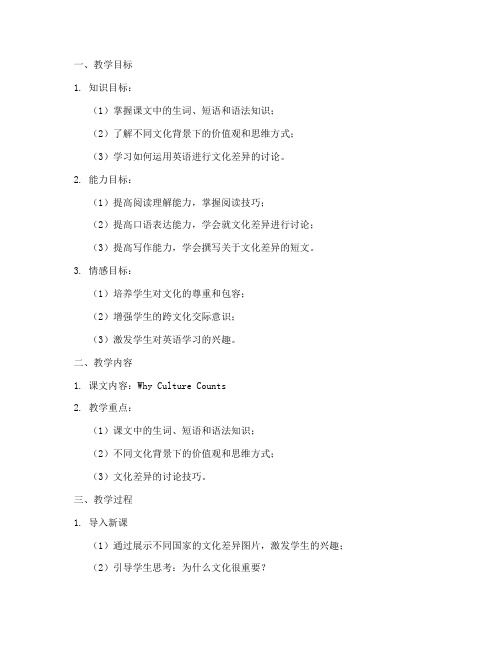
一、教学目标1. 知识目标:(1)掌握课文中的生词、短语和语法知识;(2)了解不同文化背景下的价值观和思维方式;(3)学习如何运用英语进行文化差异的讨论。
2. 能力目标:(1)提高阅读理解能力,掌握阅读技巧;(2)提高口语表达能力,学会就文化差异进行讨论;(3)提高写作能力,学会撰写关于文化差异的短文。
3. 情感目标:(1)培养学生对文化的尊重和包容;(2)增强学生的跨文化交际意识;(3)激发学生对英语学习的兴趣。
二、教学内容1. 课文内容:Why Culture Counts2. 教学重点:(1)课文中的生词、短语和语法知识;(2)不同文化背景下的价值观和思维方式;(3)文化差异的讨论技巧。
三、教学过程1. 导入新课(1)通过展示不同国家的文化差异图片,激发学生的兴趣;(2)引导学生思考:为什么文化很重要?2. 预习课文(1)学生快速浏览课文,了解文章大意;(2)教师提问,检查学生对课文内容的掌握情况。
3. 课文讲解(1)教师讲解课文中的生词、短语和语法知识;(2)分析课文中的文化差异,引导学生思考;(3)通过提问、讨论等方式,帮助学生深入理解课文内容。
4. 练习活动(1)词汇练习:让学生根据课文内容,完成词汇填空、翻译等练习;(2)阅读理解:让学生阅读相关文章,了解文化差异;(3)口语练习:让学生就文化差异进行讨论,提高口语表达能力。
5. 写作训练(1)教师讲解写作技巧,如:引言、正文、结论等;(2)布置写作任务:让学生撰写一篇关于文化差异的短文;(3)学生完成写作任务,教师批改并给予反馈。
6. 总结与反思(1)教师总结本节课的教学内容;(2)引导学生反思:通过本节课的学习,自己对文化差异有了哪些认识?四、教学评价1. 课堂参与度:观察学生在课堂上的发言情况,了解其对文化差异的认识;2. 作业完成情况:检查学生完成写作任务的质量;3. 考试成绩:通过单元测试,了解学生对本节课教学内容的掌握程度。
新视野大学英语第四册unit 5newPPT课件
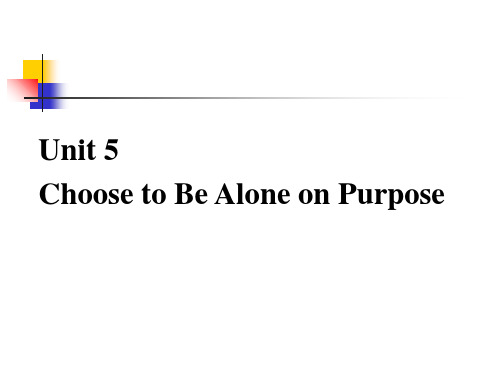
Backgrounຫໍສະໝຸດ information1. Henry David Thoreau (1817—1862) was an US thinker,
essayist, and naturalist. Thoreau graduated from Harvard University and taught school for several years before leaving his job to become a poet of nature. In the years 1845—1847, to demonstrate how satisfying a simple life could be, he lived in a hut beside Concord's Walden Pond; essays recording his daily life were assembled for his masterwork, Walden, or Life in the Woods (1854). His A Week on the Concord and Merrimack Rivers (1849) was the only other book he published in his lifetime. In later years his interest in Transcendentalism waned, and he became a dedicated abolitionist. His many nature writings and records of his wanderings in Canada, Maine, and Cape Cod display the mind of a keen naturalist.
新视野大学英语第四册unit5B...
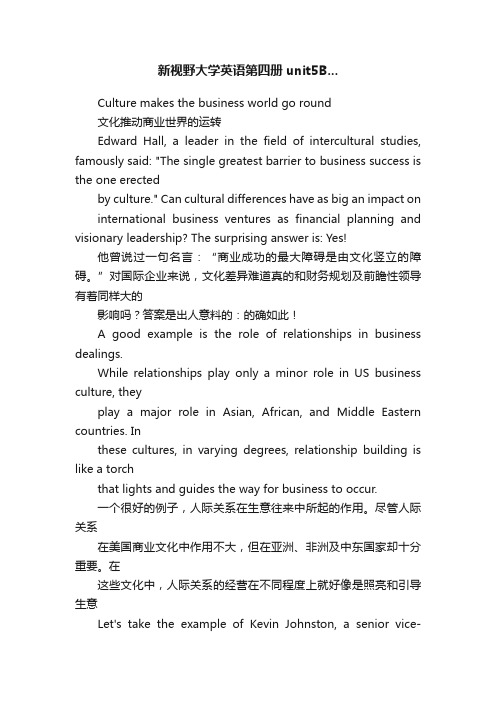
新视野大学英语第四册unit5B...Culture makes the business world go round文化推动商业世界的运转Edward Hall, a leader in the field of intercultural studies, famously said: "The single greatest barrier to business success is the one erectedby culture." Can cultural differences have as big an impact on international business ventures as financial planning and visionary leadership? The surprising answer is: Yes!他曾说过一句名言:“商业成功的最大障碍是由文化竖立的障碍。
”对国际企业来说,文化差异难道真的和财务规划及前瞻性领导有着同样大的影响吗?答案是出人意料的:的确如此!A good example is the role of relationships in business dealings.While relationships play only a minor role in US business culture, theyplay a major role in Asian, African, and Middle Eastern countries. Inthese cultures, in varying degrees, relationship building is like a torchthat lights and guides the way for business to occur.一个很好的例子,人际关系在生意往来中所起的作用。
新视野大学英语(第二版)读写教程第四册Unit5单词及详解
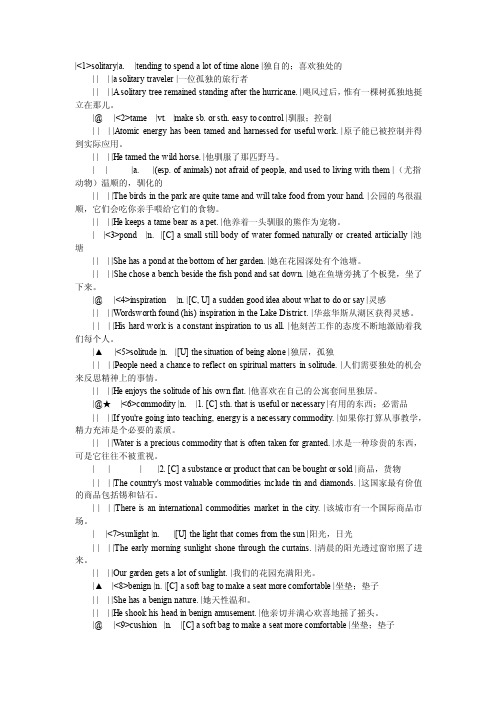
|<1>solitary|a. |tending to spend a lot of time alone |独自的;喜欢独处的| | | |a solitary traveler |一位孤独的旅行者| | | |A solitary tree remained standing after the hurricane. |飓风过后,惟有一棵树孤独地挺立在那儿。
|@ |<2>tame |vt. |make sb. or sth. easy to control |驯服;控制| | | |Atomic energy has been tamed and harnessed for useful work. |原子能已被控制并得到实际应用。
| | | |He tamed the wild horse. |他驯服了那匹野马。
| | |a. |(esp. of animals) not afraid of people, and used to living with them |(尤指动物)温顺的,驯化的| | | |The birds in the park are quite tame and will take food from your hand. |公园的鸟很温顺,它们会吃你亲手喂给它们的食物。
| | | |He keeps a tame bear as a pet. |他养着一头驯服的熊作为宠物。
| |<3>pond |n. |[C] a small still body of water formed naturally or created artiicially |池塘| | | |She has a pond at the bottom of her garden. |她在花园深处有个池塘。
| | | |She chose a bench beside the fish pond and sat down. |她在鱼塘旁挑了个板凳,坐了下来。
新视野大学英语第三版第四册Unit 5单词讲解
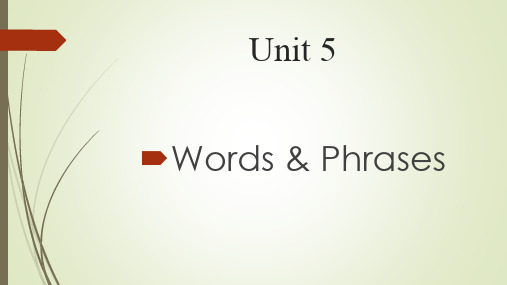
(an accident / blame / be attached to) Don’t worry because it was an accident and no blame is attached to students.
作为副业;
作为兼职
短语逆译 on the side
短语应用
她的丈夫是个医生,业余时间做些雕塑。
office. • 他开始了第四届任期。
5. reciprocal
ADJ
• involving two people or groups who agree to help each other or behave in the same way to each other 互惠的;相应的
• • The two colleges have a reciprocal arrangement whereby (凭此,借以) students from one college can attend classes at the other.
denotes the distance covered. 在这个例子中,X表示所用的时间,Y表示所行的距离。 •The red triangle denotes danger. 红色三角形表示危险。 •Here ‘family’ denotes mother, father and children. 此处的family指母亲、父亲和孩子。
世间的;世俗的;现世的
•Although spiritual leader of millions of people, the Pope has no temporal power.
教皇虽然是亿万人的精神领袖,但没有丝毫的 世俗权力。
新视野大学英语第四册读写教程unit5ppt
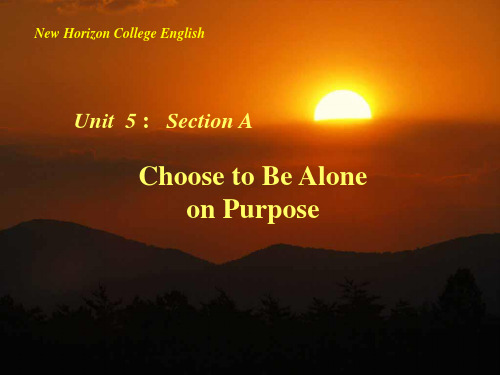
Detailed Study of Text
Back
Para 7 You may have noticed that most of these artistic types went outdoors to be alone. The indoors was full of loved ones keeping the kettle warm till they came home.
Para 1 Here we are, all by ourselves, all 22 million of us by recent count, alone in our rooms, some of us liking it that way and some of us not. Some of us divorced, some widowed, some never yet committed.
New Horizon College English
Unit 5 : Section A
Choose to Be Alone on Purpose
Lead - in Background Information Text Study Summary Writing
4
5
Warming Up
Look at some pictures. Can you divide them into different groups?
n. v. n. n. n. vi. n. a. vi.
[C,U] 评论 观察;注意 评论/观察 观察;
1. 说不出话来 2. (使)窒息; 窒息;
[C] 包裹 [C]鹦鹉 鹦鹉 [C] 运动员 溜冰, 溜冰,滑冰 [C] 溜冰者,滑冰者 溜冰者, 自我为中心的, 自我为中心的,自私的 封;密封
- 1、下载文档前请自行甄别文档内容的完整性,平台不提供额外的编辑、内容补充、找答案等附加服务。
- 2、"仅部分预览"的文档,不可在线预览部分如存在完整性等问题,可反馈申请退款(可完整预览的文档不适用该条件!)。
- 3、如文档侵犯您的权益,请联系客服反馈,我们会尽快为您处理(人工客服工作时间:9:00-18:30)。
Teaching Planning & Teaching LecturesNew Horizon College English IVUnit 51.教学目标及基本要求:Objectives:Students will be able to:1)Grasp the main idea (that it would be ideal if we can strike a balance between theChinese and the Western learning styles) and structure of the text (introduction of the topic by an anecdote—elaboration by comparison and contrast);2)Appreciate the difference between comparison and contrast, as well as different ways tocompare and contrast(point-by-point method or one-side-at-a-time method);3)Master the key language points and grammatical structures in the text;4)Conduct a series of reading, listening, speaking and writing activities related to thetheme of the unit.2. 教学重点及难点:Important language points in the text:3. 教学内容的深化及拓宽:Students conduct a series of reading, listening, speaking and writing practice to deepen their understanding of the points taught in class.4. 教学方式及在教学中应注意的问题:A combination of traditional teaching methods with the communicative approach will beadopted. Special attention should be paid to classroom interaction. Give students time to adapt to the new teaching mode in the university that are quite different from the one they were used to in the middle school. More encouragement is needed and more guidance will be given to them in their extracurricular study.5. 教学内容及学时分配:Time allotment:1st period: pre-reading; text organization2nd period: while-reading (Paras 1-5)3rd period: while-reading (Paras 6-13)4th period: while-reading (Paras 6-13 continued, Para 14)5th period: post-reading activities (Debate; Exercises)6th period: Check on students’ home reading (Text B); Theme- Related Language Learning Tasks)6. 主要参考书目:郑树棠,胡全生,2003,《新视野大学英语综合教程4-教师用书》。
外语教学与研究出版社。
新视野大学英语综合教程学习指导国防工业出版社。
新视野大学英语综合教程(学生自学辅导)外语教学与研究出版社。
潘晓燕,2006,《大学英语新四级题型攻略》上海交大出版社大学英语新要求词汇手册外语教学与研究出版社。
LONGMAN Dictionary of contemporary English 外语教学与研究出版社。
现代英语用法词典外语教学与研究出版社。
7. 思考题和习题:《新视野大学英语读写教程4》第5单元Text A后的所有习题阅读第5单元Text B,完成后面的相关练习《新视野大学英语快速阅读4》第5单元及相关练习Writing AssignmentPeriods 1-2Class Planning:1. Teaching Material:Unit 5 Section A2. Teaching Objectives1) Let students grasp the new words and expressions2) Let students master the meaning of each word including English and Chinese meaning.3. Teaching Focussome important new words4. Teaching Methods1) Interactive Teaching2) Communicative Teaching5. Teaching AidsTeaching notes prepared by the teacher6. Time Allotment:1) Pre-reading Tasks (25’)2) While-reading Tasksa) Cultural Notes (5’)b) Questions & Introduction (10’)c) Explanationof new words (35’ )3) Post-reading TasksAfter-text Exercises (5’)7. Assignment:1) Master new words & phrases.2) Do after-text exercises.8. ProcedureStep 1 Revision : Dictation of words and phrases of section B of Unit 4Step 2 IntroductionPreview of unit 5The patterns of personal relationships are changing across the globe. Traditional families and friendships are giving way to more modern interrelationships. In the following articles, the writers present a range of practices that characterize this period of relational and familial change:living alone, sharing a room with others and arranged marriage. Passage A looks at two contrasting sides of solitude:the American hero or literary giant who choose to be alone and how solitude is seen as promoting both a strong character and creative inspiration and, how individuals feel about and react to loneliness that is not of their own choosing. The second passage discusses the problems that can arise when college students have to share a dormitory with each other. Differences in preferred lifestyles can often lead to irritation and tension and can occasionally explode into violence. Passage C is a personal account of a USA educated Indian woman who, despite having taken on the western value of individualism, still chose to be part of a traditional arranged marriage.Step 3 ExplanationNew words1. solitary a. alone; lonely; without companions 独自的,孤独的e.g. The old man leads a solitary life..老人过着孤单的生活。
2.tame v. 1.make sb . or sth. easy to control 制服,控制并利用e.g. Man has tamed much of nature and made it work for him.人类在很多方面已经征服了自然,使其为自己服务。
2 train an animal or a bird not to be afraid of humans and to be obedient 驯服e.g. It is impossible to tame some animals.有些动物不可能驯化。
a. (esp. of animals)not wild or fierce, either naturally or because oftraining or long involvement with humans. (尤指动物)温顺的e.g. He keeps a tame lion.他饲养着一只驯服的狮子。
